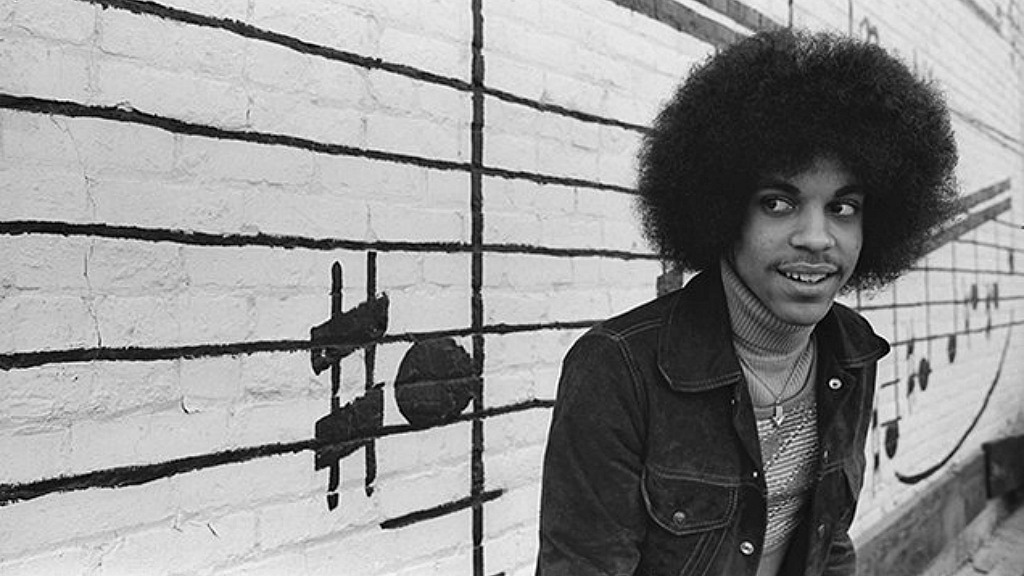FUV Essentials: Kara Manning on Prince

Prince in 1977, Minneapolis, Minnesota, taken at the Schmitt Music building (photo by Robert Whitman, by permission of the photographer)
Sadly, according to the rules of coolness, I was tardy to Prince's party. I have a hazy, rainy afternoon memory of hearing "I Wanna Be Your Lover" for the first time on the radio when I was a kid—a pleading falsetto from a battered boombox in a stable where I was learning how to braid a little bay pony's mane. But Prince really didn't gel for me until 1982 when I first saw the video for "1999" on MTV. Holy moly. He was already on his fourth album: I was pretty damn late.
Prince makes an incredible entrance in that promo clip; he was a swashbuckling, guitar-slinging, purple-frocked sylph who grabbed the mic like a preacher. I was struck by the bleak lyrics ("we could all die any day") countered by a propulsive synth groove that demanded you dance, never mind the apocalypse. You couldn't look away from him, he was that compelling and beautiful. His band was a rainbow of races and genders, with two women prominently featured in his band: keyboardist Lisa Coleman and singer Jill Jones.
Not that I figured all of that out so quickly back in 1982. Although videos of the early '80s featured some mighty women, like Chrissie Hynde, Pat Benatar, and Debbie Harry, MTV was excruciatingly white in its playlist. So white, in fact, that even David Bowie challenged then-VJ Mark Goodman, on the blatant disparity. Goodman's bumbling response, as an incredulous Bowie narrowed his eyes at him, was that viewers in Poughkeepsie or the Midwest would be "scared to death" of black artists like Prince. Well, as a girl who had partly grown up in Milwaukee, Wisconsin, raised on "Soul Train" and my mother's reggae albums, I wasn't "scared" of Prince at all, but thrilled by him: an instant crush.
The joyride of Purple Rain that followed was a rock 'n' roll triumph—is there a more perfect segue than that accelerated bridge that links "I Would Die 4 U" with "Baby I'm A Star" like a speeding, funked-out locomotive? In restrospect, the film "Purple Rain" had its tone-deaf, misogynistic bumps, but Prince, as a songwriter and boss, was far more feminist in his thinking and actions. He constantly hired women as bandmates and engineers and sought them out as collaboraters: a very partial list would include Coleman, Jones, guitarist Wendy Melvoin, bassist Rhonda Smith, keyboardist Gayle Chapman, singer, keyboardist and songwriter Rosie Gaines, saxophonist Candy Dulfer, songwriter Susannah Melvoin (Wendy's twin sister), vocalist Cat Glover, 3rdEyeGirl, sound engineers Susan Rogers and Sylvia Massy, dancer Misty Copeland, singer Lianne La Havas, and of course, the remarkable percussionist and drummer Sheila Escovedo, aka Sheila E, perhaps his most synergetic musical partner. As a unit, Prince and Sheila E were like funk's Fred Astaire and Ginger Rogers: there might be no sexier 12-inch single than their grinding pas de deux, "Erotic City."
Prince's songs elevated sexual equality between men and women: he explored female eroticism and sensuality in a way that still feels daring. The songs he wrote for Sheena Easton ("Sugar Walls"), Vanity 6 ("Nasty Girl"), and for his own albums ("Darling Nikki") famously incurred the wrath of Tipper Gore and the PMRC. But it was the deeper, lesser-known cuts written for and about women where Prince was at his most confessional, raw, and candid: "The Ballad of Dorothy Parker," "Pink Cashmere," "Crystal Ball," "If I Was Your Girlfriend," "Joy in Repetition," "Sweet Baby," "Friend, Lover, Sister, Mother/wife," and so many more. His apologies to former lovers were epic as well, from "Purple Rain" to the startling "Breakdown," from 2014's Art Official Age.
In the weeks following Prince's death, I've dragged out all of his albums, and have been revisiting them one by one, afraid of letting him go. It's impossible to pick a favorite and I won't, but I've returned to Parade a lot, perhaps because it's the most unpredictable of his '80s albums, lush with the late Clare Fischer's arrangements and two songs even co-written by Prince's father. While Parade might be best known for the astounding "Kiss," it's a lean, personal and often gentle album with a pep talk ("Mountains") and a eulogy ("Sometimes It Snows in April") too.
Maybe all three songs sum up Prince at his best as a songwriter and a man: seductive, transcendent, and infinitely tender.

